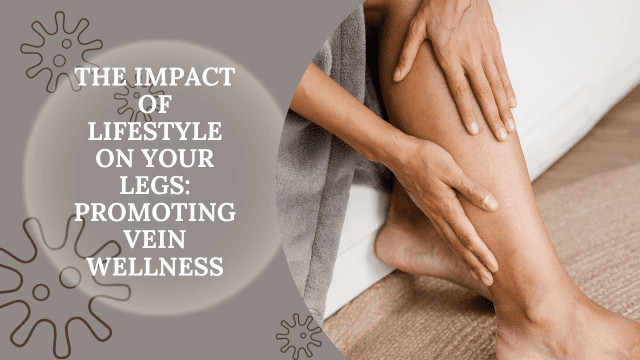The Impact of Lifestyle on Your Legs: Promoting Vein Wellness
Nov 16, 2023

Our lifestyle choices play a significant role in influencing our overall health, and when it comes to vascular wellness, our legs are often a focal point. Healthy veins are essential for efficient blood circulation, and maintaining vein wellness is key to preventing conditions like venous insufficiency. In this article, we'll delve into the impact of lifestyle on your legs and explore strategies for promoting optimal vein health.
Understanding Vein Health:
Before we explore the lifestyle factors influencing vein wellness, let's briefly understand the importance of healthy veins. Veins are responsible for carrying blood back to the heart, overcoming the challenges of gravity. Valves within the veins prevent backward flow, ensuring a unidirectional movement of blood. When veins function optimally, blood circulates efficiently, reducing the risk of conditions like venous insufficiency and varicose veins.
**1. Maintain a Healthy Weight: Excess weight places added stress on the veins, particularly those in the legs. This increased pressure can lead to weakened valves and compromised blood flow, contributing to the development of venous insufficiency. Adopting a balanced diet and engaging in regular exercise can help manage weight and promote vein wellness.
2. Regular Physical Activity: Physical activity is a cornerstone of promoting vein health. Regular exercise strengthens the leg muscles, assisting in the pumping of blood back to the heart. Activities such as walking, swimming, and cycling are particularly beneficial for enhancing circulation and preventing issues like venous insufficiency.
3. Hydration Matters: Proper hydration is essential for maintaining blood volume and viscosity. Dehydration can lead to thicker blood, increasing the risk of clot formation and impacting vein health. Ensure you stay adequately hydrated throughout the day to support optimal blood circulation.
4. Healthy Diet Choices: A diet rich in fruits, vegetables, and whole grains provides essential nutrients that support vascular health. Antioxidants found in these foods help combat inflammation and oxidative stress, contributing to overall vein wellness. Additionally, limiting processed foods and excessive salt intake can prevent water retention and promote healthy veins.
5. Avoid Prolonged Sitting or Standing: Both prolonged sitting and standing can adversely affect vein health. If your lifestyle involves extended periods of sitting, take breaks to stand, stretch, and move your legs. If standing for prolonged periods is unavoidable, shift your weight from one leg to the other to encourage blood circulation.
6. Compression Stockings for Support: Compression stockings provide external support to the veins, helping to reduce swelling and improve blood flow. These stockings are often recommended for individuals at risk of venous insufficiency or those with existing vein issues.
7. Elevate Your Legs: Elevating your legs, especially at the end of a long day, can assist in reducing swelling and relieving pressure on the veins. This simple practice promotes venous return and is particularly beneficial for individuals prone to conditions like venous insufficiency.
8. Stress Management: Chronic stress can have negative effects on vascular health. Practices such as meditation, deep breathing exercises, and mindfulness can help manage stress levels, contributing to overall vein wellness.
9. Quit Smoking: Smoking is known to constrict blood vessels and impede blood flow. Quitting smoking is a crucial step in promoting vascular health and reducing the risk of conditions like venous insufficiency.
The Role of Lifestyle in Preventing Venous Insufficiency:
Venous insufficiency, characterized by inadequate blood flow in the veins, is a condition that can be influenced by lifestyle choices. Adopting a vein-friendly lifestyle, encompassing the aforementioned strategies, plays a vital role in preventing venous insufficiency and maintaining optimal vein health.
Conclusion:
In conclusion, the impact of lifestyle on your legs is profound when it comes to vein wellness. From maintaining a healthy weight and engaging in regular physical activity to staying hydrated and managing stress, these lifestyle choices contribute to efficient blood circulation and prevent conditions like venous insufficiency. By incorporating these practices into your daily routine, you take proactive steps towards promoting optimal vein health and ensuring that your legs continue to support you for years to come.